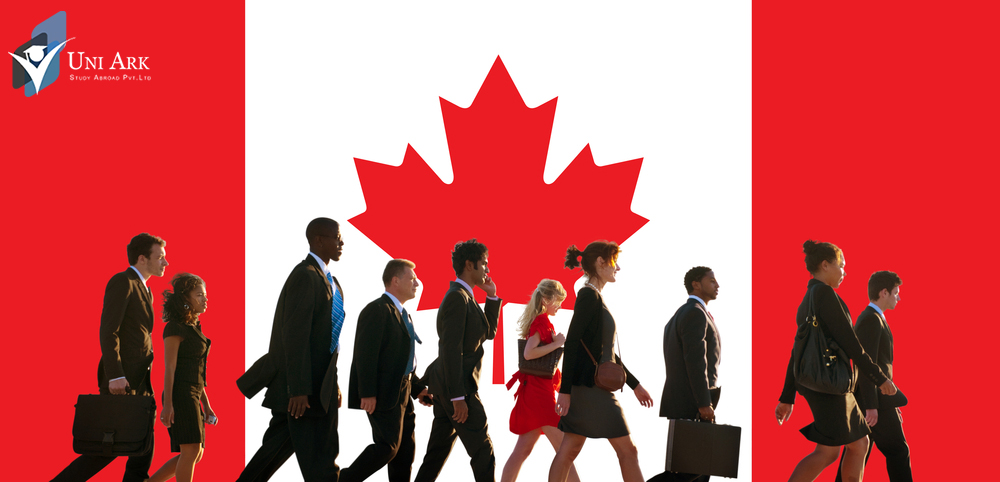
STUDY IN CANADA
Canada is a country in the northern part of North America. It extends from the Atlantic to the Pacific and northward into the Arctic Ocean, covering 9.98 million square kilometers (3.85 million square miles), making it the world's second-largest country by total area. Canada is a Federation of ten provinces and three territories (Alberta, British Columbia, Manitoba, New Brunswick, Newfoundland and Labrador, Nova Scotia, Ontario, Prince Edward Island, Quebec, and Saskatchewan) and three territories (Northwest Territories, Yukon, and Nunavut). Capital is Ottawa. It is a bilingual nation comprised of English and French speaking people. It is one of the best places to gain higher education. Both the universities and the Canadian Government provide benefits for international students. The high academic standards and quality education help provide the students with the best education to go out into the real world and start careers.
Students prefer Canada for higher education on account of various reasons. With one of the longest coastlines, vast wilderness, world-class cities, and a culture of tolerance and diversity, . Safe community, rich multicuturism, employment opportunity, beautiful country and environment, a high tech modern country, values and culture, campus lifestyle, education and scholarship, affordable cost of living, Immigration etc.. Canada has continually been a hub for international students because of all the benefits that the Canadian universities and Canadian government gives to students looking for higher education.
Benefits of Study in Canada
Top 8 reasons why Canada could be a great choice:
Academic excellence
One of the most important reasons why students choose to study in Canada is because of the high quality of education. When a student receives a degree from a Canadian university, it acts as a mark of trust and excellence. 26 of Canada's universities rank in the QS World University Rankings 2019 and 27 of them in the THE World University Rankings 2019.
Ample research opportunities
One of the biggest reasons why Canadian education stands unique is because of its strong focus on research and development. If you’re a research scholar, there can be no country better than Canada. The government of Canada offers great support to research in the disciplines of medicine, telecommunication, agriculture, environmental science and technology.
Affordable, falls in budget
Tuition fee in Canada, when compared to universities in the US and UK, is fairly cheaper. And when considering the return on investment, it is quite a viable option for Indian students. ??You can also apply to a range of scholarships to cut down on your educational expenses.
Cultural diversity
In Canada, you’ll find extremely warm and welcoming people who come from varied ethnic groups with different cultures and lifestyle. The multicultural environment in Canada promotes friendliness and peaceful living like no other country. In fact, you will find a lot of Indians studying, working and living here
You can also experience festivals and rituals such as:
- The Montreal International Jazz Festival
- Calgary Stampede
- NHL Hockey
- Experience “Poutine Week” – The blend of French fries, delicious gravy and cheese curd.
- Just for Laughs comedy Festival in Montreal
Safe and peaceful
Canada has been consistently ranked as one of the safest nations in the world. In 2018, the Global Peace Index*, listed Canada as the sixth peaceful country across the globe. As international student, you’ll enjoy the same rights as any other Canadian.
Earn while you learn
Thanks to its special regulations, Canada provides all its international students with an opportunity to work for up to 20 hours every week during their semesters and full-time during the summer and winter breaks. To work on-campus or as an intern in any company, you would not require any additional work permit as your study permit is enough to help you find a part time job.
Vibrant and lively campus life
At all Canadian campuses you can expect events, fests, and other activities being conducted all through the year. This creates a happy and lively environment for all the students, helps you network and meet new people besides keeping the homesickness away.
Immigration opportunities
Canada’s Post-Graduation Work Permit Program (PWPP) allows students to stay and work in Canada for up to three years after completion of their graduation. You can gain some international work experience and apply for permanent residency later on.
Why Migrate To Canada?
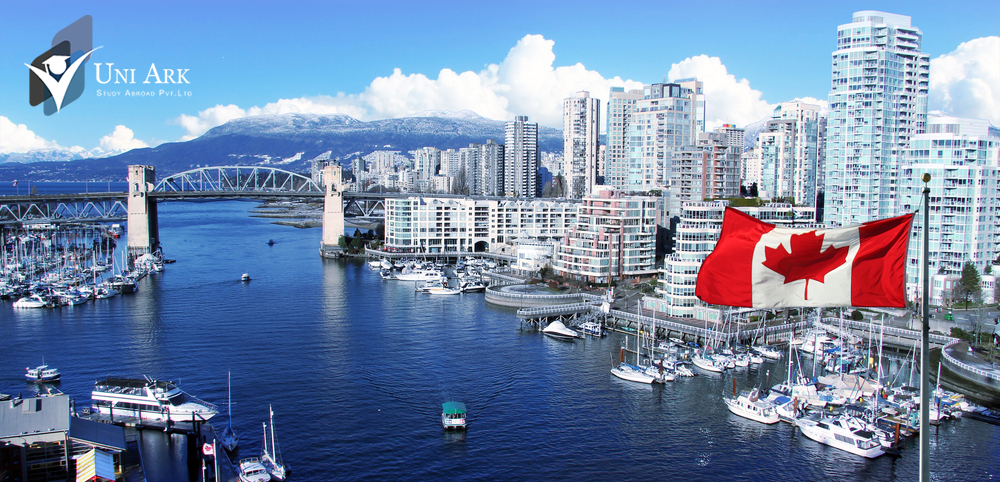
- The best country to live in the world
- Successful Migration with full family
- High average earnings for new migrants ranging from $25,000 to $70,000 annually.
- Comparatively inexpensive cost of living
- Abundant welfare schemes ranging from old age pensions, child care benefits, health insurance
- Free schooling for all students up to secondary level.
- Migration possible for skilled workers
- Eligibility for Canadian Citizenship within three years of arrival in Canada with permanent residence status.
- Dual Citizenship allowed.
- Entitlement to government welfare benefits (in case of necessity), free medical facilities, free education, old age insurance, unemployment insurance etc.
- Minimal government regulations in starting your own business.
Canada Checklist (for Application)
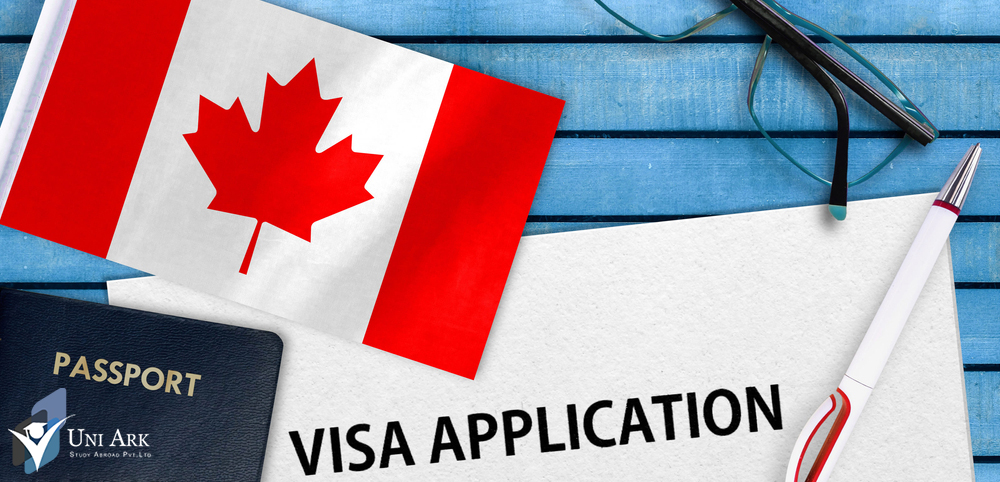
- Copy of First & Last Page of Passport
- IELTS Score card
- 10th / 12th Mark sheet and Certificates
- Updated Resume
- Bachelor’s Degree / Provisional Degree and All Semesters mark sheets
- Master’s Degree / Provisional Degree and All Semesters mark sheet
- Work Experience Certificate (If you have)
Studying Costs in Canada
Tuition fees for international students vary from province to province and depend on your faculty of choice. The following table shows the range of tuition fees for each province. Fees are in Canadian dollars – for general arts and science programs.


Living Costs In Canada
You will need approximately $10,000 CAD to cover your expenses for an academic year.. Please remember that this figure is an average only. Actual expenses may vary depending on the region of the country you live. Despite you may have to spend during winter a bit more, as Canadian winters are chilly, an adequate warm clothing budget is essential, around $ 350 CAD.
Stay Back and Work Options in Canada
A work permit under the PGWP is usually issued for the length of the study program. The maximum length of the post-work permit is of three years. It means if your post-graduate course’s duration is two years, you get a three-year PGWP visa. A post-graduation work permit cannot be valid for longer than the student’s study program. The course duration must be a minimum of eight months in length.
The PGWP allows international students graduating from a participating post-secondary college/university to gain Canadian work experience. In the long run, Canadian work experience gained through PGWP helps international graduates qualify for PR (permanent residence) in Canada through Express Entry.
Summary of Stay Back in Canada Duration:

Work Eligibility in Canada
- Students may work on the campus of the institution they are studying at, without a work permit, if they are:
- Studying full time at a public post-secondary institution or a private post-secondary institution operating under the same rules as a public one,
- They have a valid study permit
- To be able to work off campus
- A student must have a valid ‘Off campus work permit’. Such a permit allows you to work while studying but does not guarantee a job.
- The institution at which the student is studying, must have signed an ‘off campus work agreement’ with their provincial government.
- For More Details Please Click On The Following Link:
www.cic.gc.ca/english/study/work-offcampus.asp
Working While Studying In Canada
Full time students with a valid study permit, studying at an accredited public or private institution, may work on campus without a work permit. The type of work that students do under these conditions is normally that of a teaching or research assistant.
Some courses have industrial work as part of their study curriculum and have to work off-campus for a few weeks to a few months. This is often seen in case of Co-op and Internship programmes. In such cases, students have to take a work permit besides their study permit.
In most cases, work permits for students are granted if:
- The intended employment is an essential part of the programme under study.
- The employment is certified with a letter by a responsible official of the institution where student is studying.
- The Co-op or Internship duration does not exceed 50% of the total programme of study.
- For More Details Please Click On The Following Link:
www.cic.gc.ca/english/study/work-coop.asp
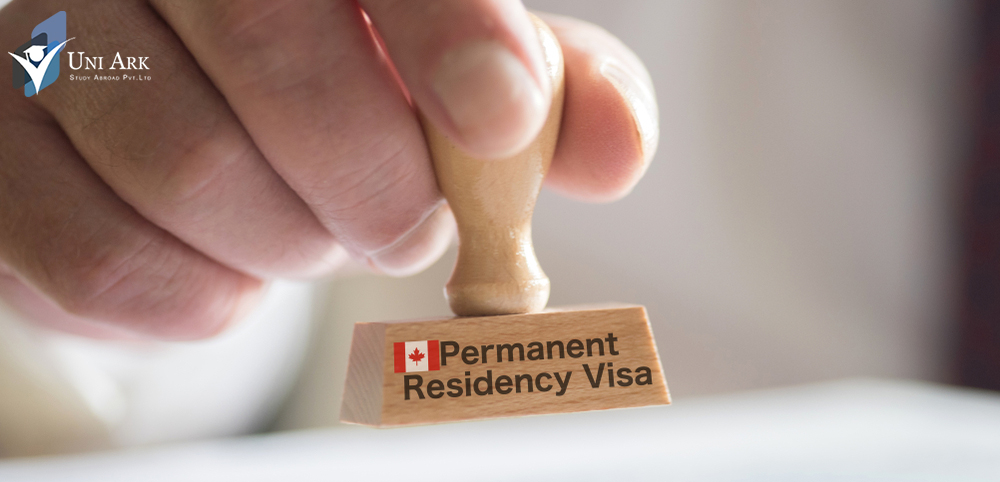
Applying for PR in Canada
- If you have completed any course from a reputed Canadian institute with a duration of 2 years and you also have a work experience of 1 year in the any skilled position, you are eligible to apply for a permanent residence ship under a system called Canadian Experience Class.
- You can also be subjective for eligibility to permanent resident ship through another system which is known as Provincial Nominee Program.
- A point system has been introduced in the new regulation effective from November 2016. According to this system, an international student is entitled to earn 15 points if he or she completes a full time one year to two-year degree program after secondary education.
- If you complete a full-time Master’s program or if you have enrolled yourself for a doctoral fellowship, or you have completed any course program of a duration of 3 years at a post-secondary level you are eligible to earn 30 points.
Trending Courses in CANADA For Overseas Students
Canada is one of the famous destinations for Indian students to study abroad. Students prefer to study in Canada because of various factors like average tuition fees, good standard of living, ample job opportunities, easy work permit and immigration status .
Some of the Trending Courses in Canada are:
- Post Graduate Diploma in Applied Manufacturing Management
- Post Graduate Diploma Business Development and Sales
- Post Graduate Diploma Computer Application Security
- Post Graduate Diploma Early Childhood Education
- Post Graduate Diploma information technology business analysis
- Graduate Certificate in Computer Applications
- Graduate Certificate in Public Relations

Student Visa & Fund requirements
Canada Visa Application Process
1. Apply at a Canadian university and get your acceptance letter
2. Start your application for the Canadian student visa
As soon as you got the acceptance letter from the university, it is time to proceed to the next step: applying for a student visa, which is locally known as a study permit.
The first steps to obtaining your student visa:
- Apply online for your Canadian student visa, on the Citizenship and Immigration Canada (CIC) website before you arrive in Canada
- Send the visa application documents by post if you have a limited internet connection or cannot submit the documents online.
- Provide an acceptance letter from a designated learning institution (a university recognized by the Canadian government).
- Deliver proof of sufficient financial resources to support your studies in Canada (tuition fees and living expenses).
- Present proof confirming you have no criminal record.
- Submit clinical records that state you are in good health; submit complete medical examinations if required.
3. Prepare all required documents for the student visa in Canada
- Filled-in student permit application form
- The original letter of acceptance from the university
- A valid passport/travel document, which also allows you to return to your home country. If you live in the USA, this is not necessary.
- Two recent passport-size photographs, with specifications of name and date of birth on the back
- Proof of financial support during your study programme. This means proving you have between 10,000 and 11,000 CAD per year for living in the country.
- A letter of intent
- If you plan to study in Quebec, you will also need a Certificat d’acceptation du Québec, English and French translations of your document, a statement from the translator and a certified copy of the original documents
- Proof that you paid the study permit fee (150 CAD)
4. Language requirements for studying in Canada
Proof of English language skills is not included on the list of required documents for a Canadian student visa. But unless you come from an English-speaking country, Canadian universities will require you to submit proof of English language proficiency. Accepted language tests:
- IELTS Academic
- The original letter of acceptance from the university
- TOEFL iBT
- PTE Academic
- C1 Advanced
5. Biometrics appointment and interview
Depending on your nationality, you might have to show up at a Visa Application Centre in your country to have your biometrics taken. The biometrics fee is 85 CAD. This fee is in addition to the regular visa application fee. Some countries are exempt from this biometrics requirement, so their citizens won’t need to visit an application centre at all.
Depending on your individual situation, you might also be called for an interview. Local visa application centres will charge a small fee for using their services.

Student Visa In Canada
The Canadian Government provides an opportunity to all Indian students to study in the country but as a prerequisite, you’ll have to obtain a Study Permit and a Temporary Resident Visa (TRV).
What is a study permit?
It’s a permit or a document issued by the Citizen and Immigration (CIC) which allows you to study in Canada. If you hold a study permit, you must remain enrolled and make reasonable and timely progress towards completing your course.
Along with your study permit, you will also need a Temporary Resident Visa (TRV) for your entry in Canada. Please note that a study permit is a document that allows you to study in Canada while a TRV is a visa that allows you to enter in Canada. Your counsellor will help you access the latest information.
Documents required for your study permit
- To apply for your study permit, you will need:
- The original letter of acceptance from the university
- An acceptance letter from your education institution, and
- A valid passport or travel document
You must also:
- Prove that you have enough money to pay for your:
• Tuition fees
• Living expenses for yourself and any family members who come with you to Canada, and
• Return transportation for yourself and any family members who come with you to Canada - Be a law-abiding citizen with no criminal record and not be a risk to the security of Canada (you may have to provide a police certificate)
- Be in good health (you may need to complete a medical exam)
- You will also be required to appear for a personal interview at the Canadian embassy or consulate.
To prove you can financially support yourself and any accompanying family members, you may be asked to provide:
- Documentation of a Canadian bank account in your name, if money has been transferred to Canada
- Documentation of a student/education loan from a financial institution
- Bank statements
- A bank draft in convertible currency
- Proof of payment of tuition and accommodation fees
- A letter for the person or institution providing your funding
- Proof of funding paid from within Canada if you have a scholarship or are enrolled in a Canadian-funded educational program
*Please note that these are the basic requirements.
Applying for your visa online
You’ll have to apply for your student visa application online using the CIC official website. You can apply up to four months before your intended date of travel to Canada. Remember, your application date is the date when your application fee is paid.
Study permit fee
As an applicant from outside Canada, you will have to pay CAD235 $which include Biometric fee as well (150 CAD + 85 CAD)
Fund Requirement
Funds Required Outside of Quebec:

Funds Required Within Quebec:
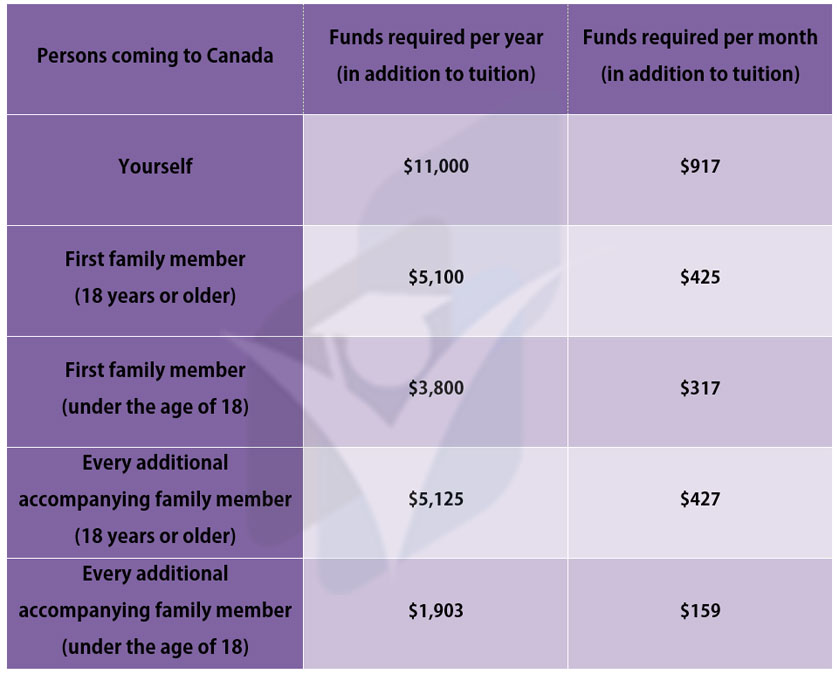
Work Options in Canada
A work permit under the PGWP is usually issued for the length of the study program. The maximum length of the post-work permit is of three years. It means if your post-graduate course’s duration is two years, you get a three-year PGWP visa. A post-graduation work permit cannot be valid for longer than the student’s study program. The course duration must be a minimum of eight months in length.
The PGWP allows international students graduating from a participating post-secondary college/university to gain Canadian work experience. In the long run, Canadian work experience gained through PGWP helps international graduates qualify for PR (permanent residence) in Canada through Express Entry.
Work Eligibility In Canada
Students may work on the campus of the institution they are studying at, without a work permit, if they are:
Studying full time at a public post secondary institution or a private post secondary institution operating under the same rules as a public one,
They have a valid study permit.
To be able to work off campus, A student must have a valid ‘Off campus work permit’. Such a permit allows you to work while studying but does not guarantee a job.
The institution at which the student is studying, must have signed an ‘off campus work agreement’ with their provincial government.

Working While Studying In Canada
Full time students with a valid study permit, studying at an accredited public or private institution, may work on campus without a work permit. The type of work that students do under these conditions is normally that of a teaching or research assistant.
Some courses have industrial work as part of their study curriculum and have to work off-campus for a few weeks to a few months. This is often seen in case of Co-op and Internship programmes. In such cases, students have to take a work permit besides their study permit.
In most cases, work permits for students are granted if:
The intended employment is an essential part of the programme under study.
The employment is certified with a letter by a responsible official of the institution where student is studying.
The Co-op or Internship duration does not exceed 50% of the total programme of study.
